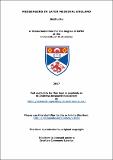Files in this item
Messengers in later medieval England
Item metadata
| dc.contributor.advisor | Cox, Rory | |
| dc.contributor.advisor | Connolly, Margaret | |
| dc.contributor.author | Hu, Jiazhu | |
| dc.coverage.spatial | ii, 103 p. | en_US |
| dc.date.accessioned | 2017-06-22T14:56:39Z | |
| dc.date.available | 2017-06-22T14:56:39Z | |
| dc.date.issued | 2017 | |
| dc.identifier.uri | https://hdl.handle.net/10023/11066 | |
| dc.description.abstract | Messengers were well acknowledged as a profession in late medieval England, providing a prototype of postal service of later centuries. Yet varied documents other than Exchequer records expose a terminological confusion in the generic term of 'messengers'; as a result, the nature of medieval messengership is not easy to approach. Though messenger activities permeated the kingdom's communication network, information about individual messengers was limited and difficult to track down. This thesis adopts an interdisciplinary perspective, and explores the nature of messengership in later medieval England mainly in three aspects: the role that messengers played in the English communication network; the messengers' position in the network of patronage; and the perception of their images in middle English literary works. Built on administrative aspects, Chapter One identifies the social status of the king's regular messengers and raises the terminological problem in documentation. This chapter continues to adopt the view of administrators, to see how messenger activities in the communication network were influenced by policies, and to cast some light on the medieval sense of information security. Chapter Two examines the symbiotic relations between the service that messengers provided and the patronage that they received, showing a particular interest in the double-edged nature of patronage. Chapter Three turns to the perspective of medieval English writers, focusing on the different approaches applied to the three messengers in Chaucer's Book of the Duchess, his Man of Law's Tale, and an unusual anonymous romance known as Athelston. | en_US |
| dc.language.iso | en | en_US |
| dc.publisher | University of St Andrews | |
| dc.rights | Attribution-NonCommercial-NoDerivatives 4.0 International | * |
| dc.rights.uri | http://creativecommons.org/licenses/by-nc-nd/4.0/ | * |
| dc.subject | Medieval England | en_US |
| dc.subject | Messenger | en_US |
| dc.subject | Medieval communication | en_US |
| dc.subject | Middle English romance | en_US |
| dc.subject | Athelston | en_US |
| dc.subject | Chaucer | en_US |
| dc.subject | Patronage | en_US |
| dc.subject.lcc | HE9756.G7H8 | en |
| dc.subject.lcc | HE9756.G7H8 | |
| dc.title | Messengers in later medieval England | en_US |
| dc.type | Thesis | en_US |
| dc.type.qualificationlevel | Masters | en_US |
| dc.type.qualificationname | MPhil Master of Philosophy | en_US |
| dc.publisher.institution | The University of St Andrews | en_US |
The following licence files are associated with this item:
This item appears in the following Collection(s)
Except where otherwise noted within the work, this item's licence for re-use is described as Attribution-NonCommercial-NoDerivatives 4.0 International
Items in the St Andrews Research Repository are protected by copyright, with all rights reserved, unless otherwise indicated.


